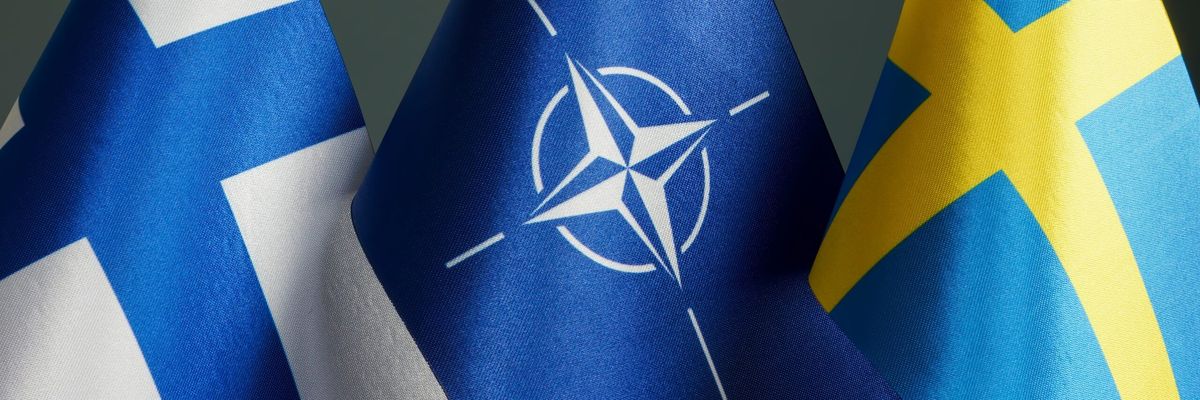There is a sad and rather pathetic irony about the expected application of Finland and Sweden to join NATO.
Throughout the Cold War, the Soviet Union was a military superpower, it occupied most of central Europe, its troops were stationed in the heart of Germany, and Soviet Communism— for a while at least — seemed to be a genuine threat to Western capitalist democracy. Throughout those decades however, Finland and Sweden remained officially neutral.
In Finland’s case, neutrality was a condition of the treaty with Moscow that wound up the wars with the USSR. In Sweden’s case — let us just say that there were great practical advantages to being in effect under America’s security umbrella without having to make any contribution to it or run any risks for it. There were also great psychological advantages to enjoying this de facto U.S. protection while remaining free at every opportunity to parade Sweden’s assumed moral superiority to imperialist and racist America.
Since the end of the Cold War, Russia retreated a thousand miles to the east while NATO and the EU expanded hugely. Today, Russia’s ground forces are in the process of demonstrating in Ukraine that they are incapable of posing any serious threat to NATO or Scandinavia. Nor did they really do so previously. To get at Sweden, Russia would have to cross either Finland or the Baltic Sea. And both during and after the Cold War, Moscow never threatened Finland. The Soviet Union strictly respected the terms of its treaty with Finland. It even withdrew from a military base there that by treaty it could have held for another forty years.
One reason was that like Ukraine (but in sharp contrast to Sweden), Finland’s heroic fight against the Soviet army had convinced Moscow that Finland was too tough a nut to try to crush. It still is, and would remain so without NATO membership, because — once again like Ukraine — Finns are determined to defend their country.
There was no reason whatsoever to think that Russia was going to change this policy and attack Finland. Whereas — however strongly one may condemn the Russian invasion of Ukraine and its accompanying atrocities — the reasons Moscow attacked it are obvious. Ever since NATO expansion began in the 1990s, both Russian officials and a succession of Western experts— including three former U.S. ambassadors to Moscow and the present head of the CIA — have been warning that the prospect of Ukraine joining an anti-Russian alliance was likely to trigger war.
NATO membership for Sweden and Finland is therefore unnecessary for their security. They for their part bring nothing to NATO. If — God forbid — the war in Ukraine brings about an escalation to war between the United States and Russia, they will be on the side lines in any case. As to NATO engagements outside Europe, one of the reasons why NATO’s European members have embraced the new confrontation with Russia so enthusiastically is that it gives them the excuse to avoid sending troops to any areas (like western Africa) where they might actually have to fight and die; and where the threat of Islamist extremism and mass migration creates real threats to European and Scandinavian internal security.
By joining NATO, Finland is throwing away whatever remote possibility exists of playing a mediating role between Russia and the West, not just to help bring about an end to the war in Ukraine, but at some point in the future to promote wider reconciliation. Instead, Finland will finish building the last section of a new Cold War border across Europe, that is likely to outlast whatever kind of regime eventually succeeds that of Putin in Russia.
Finnish and Swedish accession to NATO may also be seen to have marked the symbolic moment when European countries as a whole abandoned any dream of taking responsibility for their own continent, and resigned themselves to complete dependence on Washington. However, (as with Sweden during the Cold War) this dependence will doubtless be masked by impotent European whines and snarls when a new Trump-like president forgets the requisite thin pretense of courtesy and consultation.
At the end of a Financial Times op-ed packed with bitterly anti-Russian sentiments (based in part on an extremely and perhaps wilfully poor grasp of facts), former Finnish Prime Minister Alexander Stubb wrote:
“Security is not a zero-sum game. I hope that the Russian regime will one day understand this, too. This will allow us to re-establish good relations with Russia. In the meantime, we will help to maximise security in Europe by joining NATO. It is not against anyone, but for us. All of us.”
This is the same self-satisfied hypocrisy that has bedevilled Western policy towards Russia and U.S. policy towards most of the world. Since the end of the Cold War, U.S. and NATO policy towards Russia has in fact been overwhelmingly zero-sum, and European countries have tagged obediently behind. Finland will now join this limping, draggle-tailed entourage. Good relations with Russia are unlikely ever to be re-established, whatever regime comes to power in Moscow.
On the other hand, the complete expulsion of Russia from European structures — so long the open aim of America and NATO — may in the longer term make Russia completely strategically dependent on China and bring the Chinese superpower to the very eastern borders of Europe. That would be an ironic but not undeserved reward for European strategic fatuity. One might even find it amusing — if one were not a European.
















